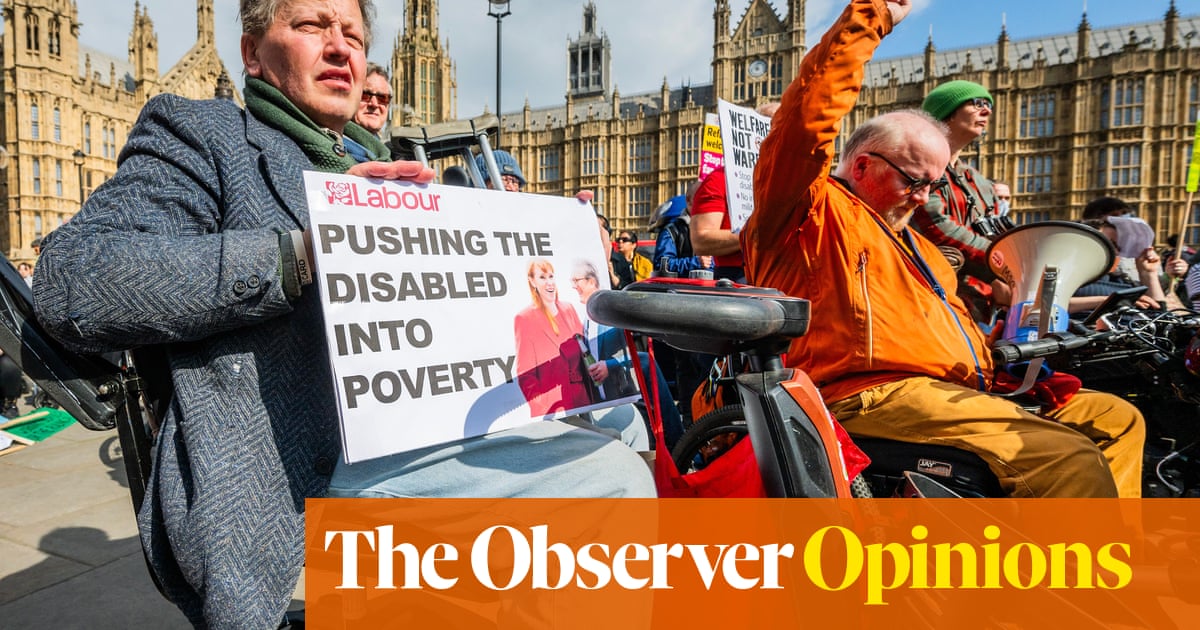
The poor don’t need Reeves’s austerity. And neither does Britain | William Keegan
Alas! Were it not for the fact that he was cremated, the great economist John Maynard Keynes would have been turning in his grave at the way the economics of last week’s spring budget – sorry, spring statement – were greeted by most of the media.
Of course, the principal culprit was the chancellor of the exchequer, Rachel Reeves. By tying herself to the mast of self-imposed fiscal rules, she managed to ensure that much of the commentary was about how she might have to raise taxes later this year, when the constraints of the fiscal straitjacket might force her to.
In the run-up to this fiscal “event”, the speculation was about whether she would have to cut public spending or raise taxes in order to balance the books. At which point I should like to draw to her attention, and to the attention of those analysts who go on about this putatively “difficult” choice, the words of a past senior Treasury civil servant, the redoubtable Sir Douglas Allen (later Lord Croham).
“What matters,” Allen once said in an interview with the historian Peter Hennessy and me, “is at what level of economic activity you balance the books”.
With the British economy close to stagnation, this is the very last point at which a chancellor should even be contemplating “balancing the books” by cutting demand, let alone doing it in a way that rightly offends so many people who voted Labour with such high expectations – by penalising disabled people. The main theme of this budget was inhumane and economically wrong.
No wonder so many Labour MPs – indeed, reportedly, including some cabinet ministers – were so uncomfortable. Reeves’s message to the infirm seemed to be “take up your bed and work”. The time for balancing the books is when the economy is enjoying a good recovery.
I think the verdict of the National Institute of Economic and Social Research is worth quoting. It said: “The focus on introducing measures to adhere to a set of self-imposed fiscal rules, rather than improving long-term trend growth, was unfortunate. Fixating on the details of fiscal book-keeping detracts from the wider problem. The current fiscal framework is not fit for purpose.”
Now, I am sure I am not the only one to have watched the chancellor’s performance and noticed the distinctly uncomfortable look on the face of the prime minister, who was sitting next to her. An attack on the poor and the disabled is surely not what a man christened with the first name of the great Labour hero, Keir Hardie, came into politics for.
But then the prime minister has other things on his mind. The diplomatic and economic crisis engineered by the moronic Donald Trump and his hoodlums has thrust Starmer into the limelight, both in Europe and the rest of the world. It has brought this country closer to the European Union it foolishly abandoned. And, as Observer reader David Newens pointed out in a letter last week: “For economic and security reasons, the UK, a nuclear power, is 1743315495 much more likely to be welcomed back by the EU.”
Starmer is trying to be an honest broker with Trump. In an interview with the New York Times he has said: “Many people are urging us to choose between the US and Europe. Churchill didn’t to it. Attlee didn’t do it. It’d be a big mistake, in my view, to choose now.”
But, Sir Keir, if I may point this out with the utmost possible respect, Roosevelt and Truman were leagues more trustworthy than Trump. This time it really is different. Trump’s gang has made its contempt for Europe patently obvious.
Apart from anything else, I think re-entry to the single market and the customs union would galvanise the government’s lacklustre “growth strategy”.
We have had Brexit, which has had a disastrous economic effect on the UK. It’s time for us to go for re-entry: Rentry!
With western Europe close to being on a war footing, the government has been struggling, from outside the EU, to gain access to its new €150bn defence fund. A declaration of an honest attempt to rejoin would assuredly not go amiss in this regard.
And when it comes to tariff wars, our government is probably deceiving itself in thinking it can secure a successful deal with Trump. As for the idea of making tax concessions to the Trumpite tech giants, such as Jeff Bezos and Elon Musk, in the hope of exemption from tariffs, one wonders what the Treasury really thinks of this.
No, President Trump is not Roosevelt, Truman or Eisenhower. He cannot be trusted. Our former EU partners need us for defence, security and economic reasons, and we need them.
Collectively, they can be a formidable force for good in the tariff wars. We should be with them.









